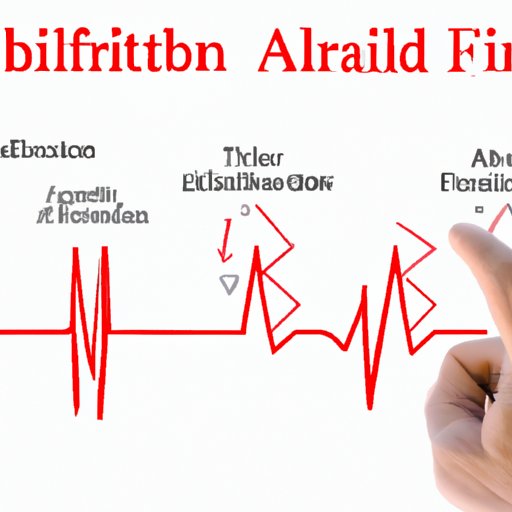
Introduction
Atrial fibrillation, also known as AFib, is a heart condition characterized by an irregular heartbeat. According to the American Heart Association, AFib affects over 2.7 million people in the United States. In this article, we will discuss the causes, risks, and management of AFib and heart disease.
AFib and Heart Health
The heart is responsible for delivering blood and oxygen throughout the body. The atria and ventricles work together to keep the heart beating normally and at a steady pace. In normal heart rhythm, the atria contract to push blood into the ventricles, and then the ventricles contract to pump blood out of the heart. In contrast, AFib occurs when the atria do not contract regularly, causing blood to pool and potentially clot. This can lead to a higher risk of developing heart disease, stroke, and other serious conditions.
Understanding the Connection between AFib and Heart Disease
Heart disease is a broad term that refers to a variety of conditions affecting the heart. The most common type of heart disease is coronary artery disease, which occurs when the arteries that supply blood to the heart become blocked or narrowed. Other types of heart disease include heart failure, heart valve disease, and arrhythmias such as AFib.
AFib is closely related to heart disease, as it can be both a symptom and a cause of other heart conditions. In fact, AFib can increase the risk of developing heart failure and other types of arrhythmias. Additionally, individuals with heart disease are more likely to develop AFib.
Managing AFib
While AFib cannot always be prevented, there are steps individuals can take to manage their condition and reduce their risk of complications. Preventative measures include avoiding triggers such as alcohol, caffeine, and stress. Lifestyle changes such as quitting smoking, maintaining a healthy weight, and exercising regularly can also improve overall heart health and reduce the risk of AFib.
Medical interventions for managing AFib include electrical cardioversion, which restores the heart’s normal rhythm with electrical shocks. Medications such as beta-blockers and calcium channel blockers can also help regulate the heartbeat. In some cases, individuals may require surgical procedures or a pacemaker to manage their AFib.
AFib Complications
Complications associated with untreated AFib include an increased risk of stroke, heart failure, and other arrhythmias. Symptoms of AFib complications may include shortness of breath, chest pain, and fatigue. Treatment options for AFib complications may include medications, surgery, or other interventions to manage symptoms and reduce complications.
Coping with AFib
Living with AFib can be challenging, but there are tools and resources available to help individuals manage their condition. Patients and caregivers can work with their healthcare provider to create a personalized treatment plan that includes lifestyle modifications, medications, and other interventions. Support from family, friends, and support groups can also be helpful in managing the emotional and physical challenges of living with AFib.
Conclusion
AFib is a common heart condition that can have serious consequences if left untreated. By understanding the causes, risks, and management options for AFib and heart disease, individuals can take steps to improve their heart health and reduce their risk of complications. We encourage anyone experiencing symptoms of AFib or heart disease to seek medical attention and take an active role in managing their condition.




